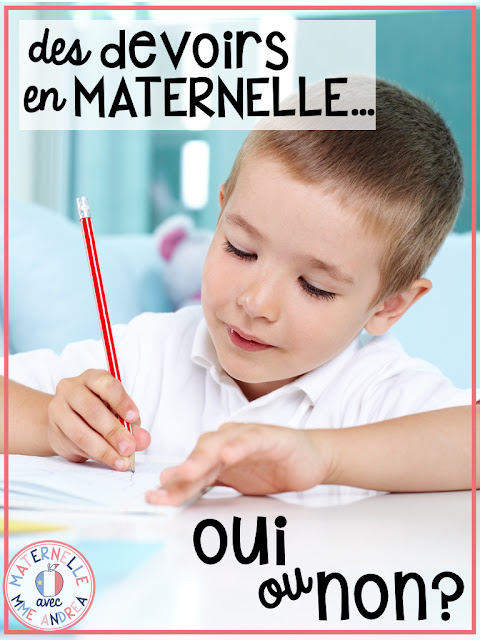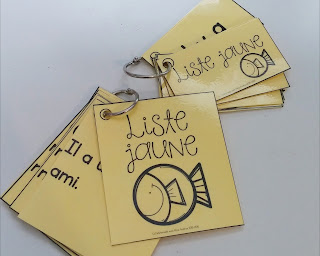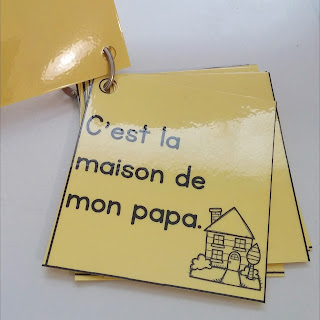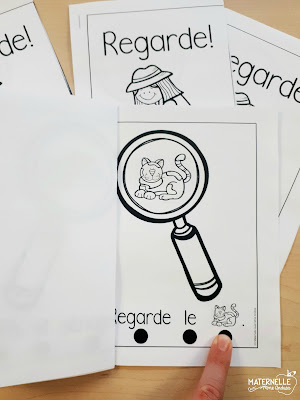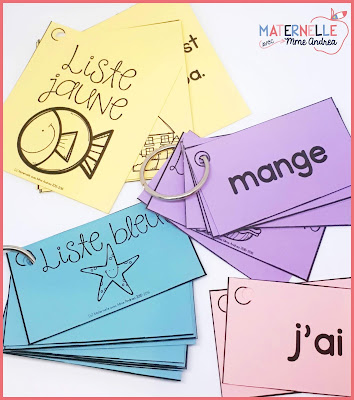Bonjour!
I am popping in today to discuss *another* somewhat controversial topic. ;)
(If you missed it, I wrote a potentially controversial post this past summer about whether it is better to teach a letter a week or a letter a day in maternelle.)
I want to talk today about homework in the primary grades!
Throughout my teaching career. I have heard lots of different opinions on homework in maternelle, and I have also had the chance to form some of my own, which I will share with you in this blog post.
First of all, I want to discuss a little bit about whether or not I think homework is even necessary or appropriate, and if there is a place for it in maternelle.
Then, I will explain what it should/should not look like to be most effective, what exactly I send home, and what are our homework “routines” that help things run smoothly.
My hope is that by the end of this blog post, you will come away with some new thoughts and ideas around homework, and maybe some ways to help make the homework that you do send home (if you send any) more meaningful and relevant.
SHOULD YOU EVEN BE SENDING HOMEWORK?
First of all, I feel I should mention that I do believe there is a place for some homework, even in maternelle.
But, it’s not very much!
And, inefficient/ineffective homework is definitely a waste of everyone’s time, and I feel it should be avoided.
I ask my kinders to spend no more than 10 minutes a night on their “homework”.
It is more important that they have lots of time for running, jumping, climbing trees, playing outside, and interacting positively with their family members.
I believe that it is also important, though, that they spend some time practicing what we have been working on at school.
Think about it – if you take piano lessons, you practice between lessons. If you want to perform in a play, you practice your lines between rehearsals. If you want to get good at hockey, you practice in between games, often in your basement or in the driveway.
(Speaking from a bit of experience, with that last one ;) )
Maybe I only feel this way because I have always been an athlete/performer, but I truly believe that if you want to get good at something, you need to practice on your own time!
Also, as much as it pains me to say it… I have 20 students. 20 students who at any point in the year can range from ages 4-6.
It is quite honestly IMPOSSIBLE to read with all of my students and practice their letters and sight words with them one-on-one every single day.
Sometimes, when it is particularly busy, I might only see certain students once a WEEK.
That is not enough practice time for any of the skills I want them to master!!!!
I think that homework can provide a great opportunity for students to get it that important practice and review, one-on-one with an adult, that they don’t always get every day at school.
But, I also believe that our students should only be practicing what is developmentally appropriate for their age at home – both content-wise and time-wise.
So, let’s take a minute to examine what good homework looks like.
Ideally, homework should be:
- quick
- review of what has already been taught
- consistent and predictable
- quality is more important than quantity
SO, WHAT DO I SEND FOR HOMEWORK?
Throughout the year, I send three different things home as homework.
1. Alphabet flash cards. Each day that we learn a new letter, we add a new flash card to our alphabet ring. I
do not send all 26 letters from the beginning of the year!!
After we learn our first four letters, I start the rings, and then add one more each day.
Remember – homework should be review, not new learning!
2. Sight word flash cards. I use
this program for my sight words. Students move through the rainbow at their own pace, learning and practicing 10 new sight words at a time. They have to master the words both in isolation and in context before moving on.
Quality is more important than quantity – it is more important to me that my students learn 10 words at a time well, rather than give them all 90 words at once and hope they acquire some of them. It is also much quicker to practice only 10 words at a time.
As my students move through the lists, the sentence cards all contain words from the previous lists as well as the current list, so they are still reviewing the words they have learned, all throughout the year.
Once students move on to words that I haven’t yet taught whole-group (some of them are really quick!), I teach the words within my small groups or one-on-one before I send them home.
(Our school stock is pretty limited, so I like to wait and send the “real” books when they are really ready!)
I send a maximum of four books at a time, but still ask parents to only practice for 10 minutes a night – whether that means one book, two books, or four books.
I only send books home that my students have already read with me – either whole group, small group, or one-on-one.
Homework should be review!
HOW DO I KEEP IT ALL ORGANIZED?
When I first started sending books home, I would spend aaaaages sorting and adding books and flashcards to their reading bags myself.
And I mean AGES!!!!
After about a year of that, I learned that ever-important piece of wisdom that says that you should never spend more time prepping an activity than it takes for your students to complete it.
So, why spend hours adding books to bags and tracking who has had what, if your students will be only practicing 10 minutes a night??
Now, I get my students to do as much of the work as possible!
When we are still doing paper books, my students add them to their own bags when they are finished colouring them.
We always read our book/poem a few times together, whole group, to make sure that everyone gets a chance to read it over a few times. They LOVE reading them in funny voices – like our principal, like Santa Claus, like a witch, etc.
Once we get into guided reading and each student has their own set of books, it can be tricky to make sure each student gets the chance to go “book shopping” and change out their books regularly.
I will do a more detailed post about book shopping soon, but basically, my students all bring four books home each night.
One book I choose (the most recent book we have done together in guided reading), and the other three books my students choose from their baskets.
Every time we learn a new book, and I add it to their bag, one book leaves their bag and goes into their basket.
In the beginning, their baskets just contain paper books, but as we read more and more books in guided reading, their baskets transition over to “real” books – and all of the books are ones that we have already read together.
Remember – homework should be review!
My students still have access to a wide variety of other books that they haven’t read with me before for silent reading, reading buddies, free play choice, etc. that they can look through and read at any time.
But for homework, all of the books that go home are books that they already know and have read with me.
Every Monday morning, we take 10 minutes and my students change out their books as a class – the one book I chose stays in the bag, and the other three they can swap out.
I do not monitor if they keep the same book in there for weeks on end – if they have a favourite book, who am I to say that they can’t keep it? Repetition is important, and homework is review!
I also do not do a reading log, or ask anyone to record or “prove” that they have been doing their homework. I would rather my students spend their time actually reading, rather than filling one of those out, and I believe that most families will do homework if it is at all possible for them.
If a family is really struggling to get homework done, I am sure they feel guilty enough already, and don’t need any additional shame from me or a reading log!
Plus, I don’t really have time to police that… and to what end? If they aren’t going to do it, I don’t think that a reading log is really going to change that.
(Of course, it is completely different with older grades, where it is up to the student to get it done and learn some responsibility! I am only talking about reading logs that parents have to fill out.)
As my students move up in reading levels, I remove the lower levels from their baskets to make sure that what they are reading at home is helpful practice – not too easy, but just easy enough.
As far as alphabet flash cards go, each morning when we learn a new letter, I give my students their new flash card and they add it to their rings. Easy peasy!
The sight words get changed out as they master each list. I evaluate students whenever I have a few spare minutes, and sometimes during our guided reading block as well.
Hopefully, this blog post has helped explain a bit what homework should look like, and has given you some ideas for things that you could send home to practice.
If you send homework to your students, keep in mind the four guiding principles. It should be quick, consistent & predictable, REVIEW, and the focus should be on the quality, not the quantity.
If you are interested in checking out any of the resources that I send home, click on the links below for a closer look!
PS – Are you a member of my FREE Resource Library for French primary teachers? If not, what are you waiting for?? Sign up below for access to every freebie I’ve ever made… and will ever make!


